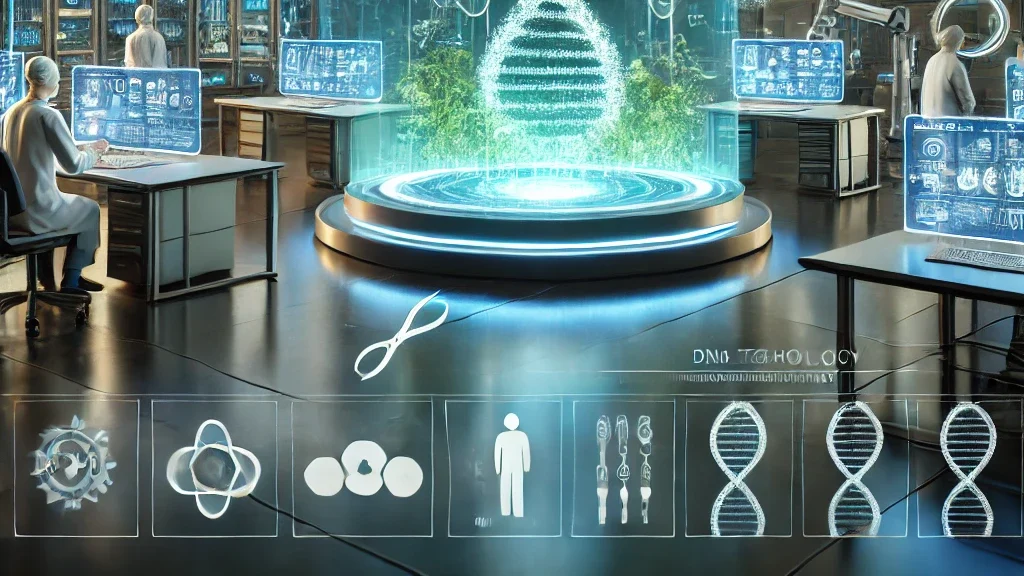
The Future of Medicine
Introduction
The intersection of biology and technology, known as biotechnology, has revolutionized the healthcare industry. From groundbreaking therapies to advanced diagnostics, biotech innovations are reshaping the way diseases are treated and prevented. In this blog, we explore how technology is advancing medicine and healthcare, highlighting key innovations and their implications for the future.
What is Biotechnology in Healthcare?
Biotechnology leverages biological processes and organisms to develop medical solutions. It encompasses areas such as:
- Genomics: Understanding and manipulating genes to predict, diagnose, and treat diseases.
- Biopharmaceuticals: Producing drugs using living organisms, such as monoclonal antibodies and vaccines.
- Medical Devices: Developing smart implants, biosensors, and diagnostic tools.
These applications are improving patient outcomes, accelerating drug development, and enabling precision medicine.
Major Biotech Innovations Transforming Healthcare
1. CRISPR and Gene Editing
CRISPR technology allows precise editing of DNA, offering hope for curing genetic disorders like cystic fibrosis and sickle cell anemia. It is also being explored in cancer immunotherapy. For an in-depth explanation of CRISPR, visit CRISPR by NIH.
2. Personalized Medicine
Biotech enables treatments tailored to individual genetic profiles. This approach is reducing trial-and-error in drug prescriptions and improving efficacy. Explore related products on our Diggabyte Market.
3. mRNA Technology
Pioneered by COVID-19 vaccines, mRNA technology is now being adapted for cancer treatment and rare diseases. Its ability to prompt the immune system to fight pathogens marks a new era in vaccine development.
4. AI in Drug Discovery
Artificial intelligence accelerates drug discovery by analyzing vast datasets to identify potential compounds. For example, machine learning has reduced the time to identify candidates for clinical trials.
5. Regenerative Medicine
Regenerative medicine, including stem cell therapy and tissue engineering, is revolutionizing treatments for organ damage and degenerative diseases. Learn more at Regenerative Medicine Journal.
Benefits of Biotechnology in Healthcare
- Early Detection: Biotech tools, like liquid biopsies, enable the detection of diseases at early stages.
- Cost-Effectiveness: Advanced manufacturing processes are reducing the costs of biopharmaceuticals.
- Accessibility: Portable diagnostic devices are improving access to healthcare in remote regions.
Challenges Facing Biotechnology
Ethical Concerns
Technologies like gene editing raise ethical questions about altering human genetics. Regulation and societal discourse are crucial to address these issues.
High Development Costs
Biotech innovations require significant investment in R&D, which can limit accessibility. Discover cost-effective solutions on our Diggabyte Market.
Regulatory Hurdles
Stringent regulatory frameworks ensure safety but can delay the deployment of life-saving technologies. Collaboration between policymakers and industry stakeholders is essential.
The Future of Biotech in Healthcare
Biotech will play a pivotal role in:
- Eradicating Rare Diseases: Gene therapies and personalized medicine hold the promise of curing diseases once considered untreatable.
- Global Health: Biotech solutions, such as portable diagnostics, will improve healthcare accessibility worldwide.
- Longevity Research: Advances in regenerative medicine may extend human lifespan while improving the quality of life.
For more insights into emerging biotech trends, visit Biotechnology Industry Organization.
Why Invest in Biotech Tools and Products?
Biotech advancements are creating opportunities for businesses and individuals to engage with cutting-edge solutions. Whether you’re a healthcare provider, researcher, or tech enthusiast, check out our curated selection of biotech products on the Diggabyte Market.
Conclusion
The biotech boom represents a transformative era in medicine and healthcare, driven by innovations like gene editing, AI, and regenerative medicine. While challenges remain, the potential to improve lives globally is immense. By embracing these technologies responsibly, we can shape a future of healthier and longer lives.
Sources:
